Drakono vaisiai – tai gyvybingi tropiniai vaisiai, žinomi dėl savo unikalios išvaizdos ir įspūdingos maistinės vertės. Juose mažai kalorijų, tačiau gausu vitaminų, mineralų ir antioksidantų, todėl jie puikiai papildo sveiką mitybą.
Drakono vaisių nauda sveikatai, įskaitant virškinimo, svorio reguliavimo ir cukraus kiekio kraujyje reguliavimą, taip pat jų antioksidacinės savybės ir kulinarinis įvairiapusiškumas nagrinėjami šiame įraše.
Trumpai
- Drakono vaisiai turi mažai kalorijų ir daug ląstelienos, todėl skatina svorio reguliavimą ir palengvina virškinimą.
- Juose gausu antioksidantų, todėl jie palaiko imuninės sistemos veiklą ir mažina uždegimus, o tai naudinga bendrai sveikatai.
- Prebiotinės vaisių savybės gerina žarnyno sveikatą ir stabilizuoja cukraus kiekį kraujyje, todėl tinka diabeto gydymui.
- Daug vitamino C ir geležies turintys drakono vaisiai didina energijos lygį ir gerina geležies įsisavinimą, todėl pagerėja medžiagų apykaita.
- Jo kulinarinis universalumas leidžia kūrybingai naudoti salotose ir kokteiliuose, suteikiant patiekalams spalvų ir maistingumo.
Antioksidacinės savybės
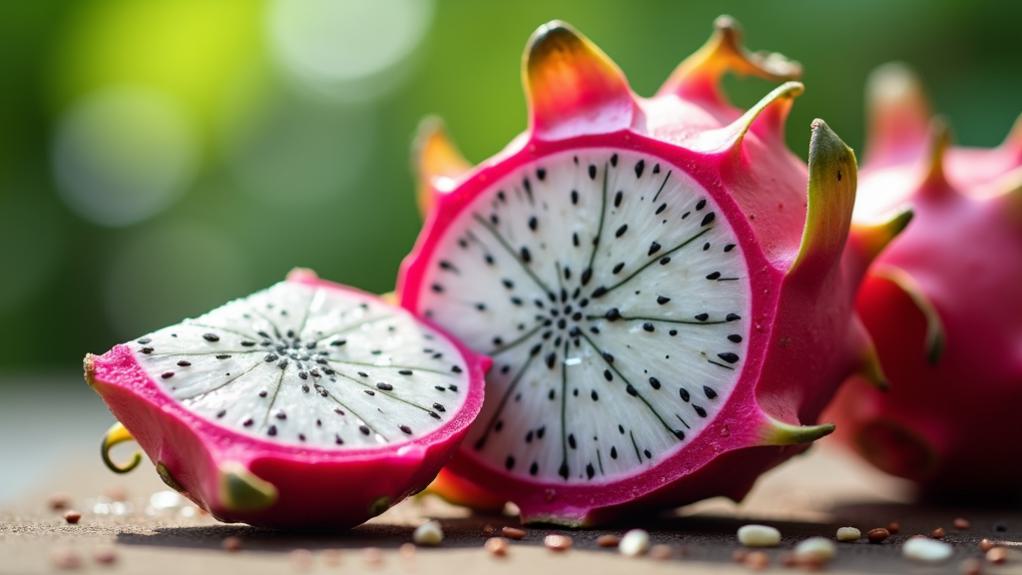
Drakono vaisiai gali pasižymėti stipriomis antioksidacinėmis savybėmis, kurios labai prisideda prie jų naudos sveikatai. Šiame egzotiškame vaisiuje gausu įvairių biologiškai aktyvių junginių, įskaitant betalainus, flavonoidus, polifenolius, taninus ir karotinoidus. Visų pirma raudonieji drakono vaisiai turi betalainų, kurie gali neutralizuoti laisvuosius radikalus ir apsaugoti nuo oksidacinio streso.
Tyrimai rodo, kad drakono vaisiai gali pasižymėti stipriu antioksidaciniu aktyvumu, o jų stiebai rodo įspūdingą 79,13 % laisvųjų radikalų slopinimą esant 100 ppm koncentracijai.
Įvairių vaisių dalių antioksidacinis pajėgumas gali skirtis: žievelėje paprastai būna daugiau flavonoidų ir taninų nei minkštime. Be to, antioksidaciniam poveikiui įtakos gali turėti ir regioniniai skirtumai, nes Australijoje auginamos veislės gali išlaikyti geresnes savybes visą galiojimo laiką.
Vaisiaus antioksidacinis profilis gali būti priešuždegiminis, priešvėžinis ir kardioprotekcinis, be to, jis gali pagerinti žarnyno sveikatą skatindamas naudingas žarnyno bakterijas.
Be to, drakono vaisių spalva gali būti susijusi su bendru antioksidantų kiekiu, todėl svarbu rinktis ryškius, gerai išsilaikiusius egzempliorius.
Maistinė vertė
Drakono vaisiai gali būti sveikatai palankus maisto papildas, nes 100 g jų porcijoje yra 60-103 kalorijos. Šis atogrąžų vaisius turi mažai kalorijų, todėl yra idealus pasirinkimas ieškantiems maistingo, bet mažai kaloringo užkandžio.
Kalbant apie makroelementus, drakono vaisiuose gali būti maždaug 0,6-1,2 g baltymų ir minimalus riebalų kiekis – nuo 0 iki 0,2 g 100 g porcijoje. Angliavandenių kiekis gali svyruoti nuo 12,9 iki 27,4 g, iš kurių 7,65-7,7 g sudaro cukrūs, lemiantys švelniai saldų skonį.
Drakono vaisiai taip pat gali būti svarbiausių vitaminų ir mineralų šaltinis. Jame yra vitamino C (2,5-7,7 mg), vitamino E (0,2 mg) ir vitamino K1 (25 µg). Be to, jame gali būti tokių mineralų kaip magnis (12,6-40 mg), geležis (0,324-0,74 mg) ir kalis (120-200 mg), kurie gyvybiškai svarbūs įvairioms organizmo funkcijoms.
Be to, drakono vaisiuose gali nebūti cholesterolio ir natrio, o jų sėklose gali būti naudingųjų omega-3 ir omega-9 riebalų rūgščių bei žarnyno sveikatą gerinančių oligosacharidų.
Skaidulos ir virškinimo sistemos sveikata
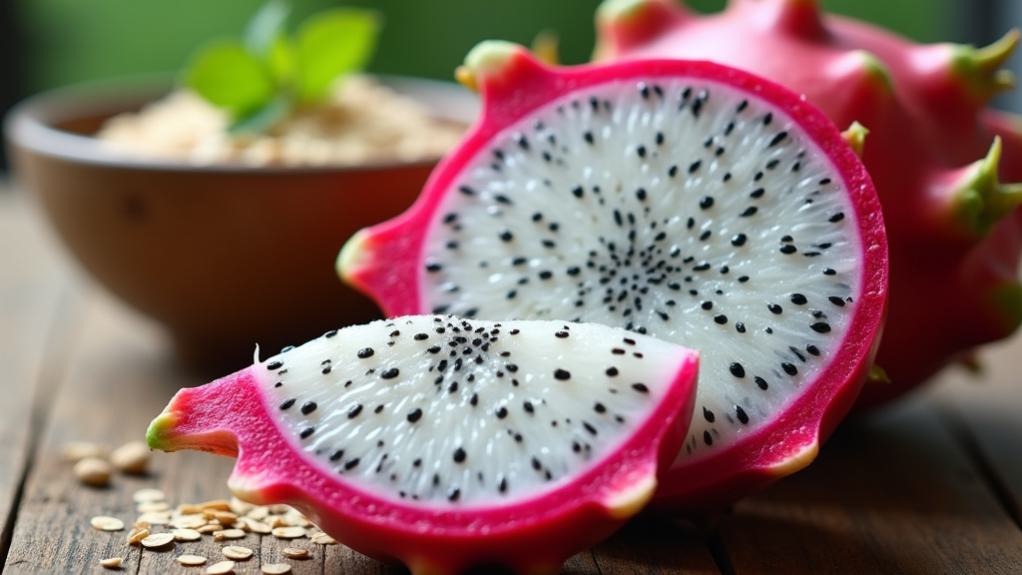
Drakono vaisiai yra puikus maistinių skaidulų šaltinis – vienoje porcijoje jų yra apie 2,9 g. Tai padeda palaikyti reguliarų žarnyno judėjimą ir bendrą virškinimo sistemos sveikatą.
Prebiotinės savybės skatina naudingųjų žarnyno bakterijų augimą ir gerina žarnyno mikrobiomo pusiausvyrą.
Be to, drakono vaisių skaidulų ir hidratacijos derinys gerina žarnyno sveikatą, mažina vidurių užkietėjimo riziką ir skatina virškinimo komfortą.
Maistinių skaidulų nauda
Didelė maistinių skaidulų nauda yra jų poveikis virškinimo sveikatai. Drakono vaisiai gali būti labai svarbūs reguliuojant žarnyno judesius ir gerinant bendras virškinimo funkcijas. Jame esančios tirpios skaidulos gali ne tik suminkštinti išmatas, bet ir palengvinti sklandesnį jų judėjimą žarnynu, todėl jis yra vertingas dietos, skirtos vidurių užkietėjimui mažinti ir lėtiniam viduriavimui gydyti, priedas.
Pagrindiniai drakono vaisių skaidulų vartojimo privalumai gali būti šie:
- gali suminkštinti išmatas, kad būtų lengviau praeiti
- Gali sureguliuoti žarnyno judesius, sumažinti vidurių užkietėjimą ir viduriavimą
- Gali padėti gydyti tokias ligas kaip hemorojus
- Gali skatinti žarnyno sveikatą, nes palaiko naudingąsias bakterijas
- Gali sumažinti virškinimo sutrikimų, tokių kaip IBS ir divertikulitas, riziką
Be to, daug skaidulų turinti dieta gali padėti palaikyti sveiką virškinimo sistemą, nes skatina peristaltiką ir didina išmatų tūrį.
Ji taip pat gali padėti stabilizuoti gliukozės kiekį, o tai labai svarbu cukriniam diabetui gydyti. Įtraukdami drakono vaisius į savo mitybos racioną, galite ne tik pagerinti virškinimo sistemos sveikatą, bet ir palaikyti bendrą savijautą dėl daugybės su skaidulomis susijusių privalumų.
Paaiškintos prebiotikų savybės
Šis atogrąžų vaisius turi oligosacharidų – trumpos grandinės angliavandenių, kurių žmogaus žarnynas nesuvirškina, tačiau jie yra maistas naudingoms bakterijoms.
Šios prebiotinės skaidulos nesuvirškinamos ir nepažeistos patenka į storąją žarną, kur jas fermentuoja žarnyno mikroorganizmai.
Fermentacijos proceso metu gali susidaryti trumpos grandinės riebalų rūgštys (SCFA), pavyzdžiui, acetatas, propionatas ir butiratas, kurios gali suteikti energijos storosios žarnos ląstelėms ir prisidėti prie pagrindinių funkcijų, įskaitant gleivių gamybą ir žarnyno pH reguliavimą.
Svarbu tai, kad butiratas gali pasižymėti priešuždegiminėmis savybėmis ir padėti įsisavinti vandenį bei elektrolitus. Be to, vartojant drakono vaisius gali būti skatinamas naudingųjų bakterijų, pavyzdžiui, Lactobacillus ir Bifidobacteria, augimas, o kenksmingosios bakterijos, pavyzdžiui, Escherichia ir Clostridium, slopinamos.
Tyrimai rodo, kad kasdien suvartojant vos 4 g drakono vaisių, gali teigiamai pakisti žarnyno mikrobiomas, sustiprėti imuninė sistema ir palaikoma bendra virškinimo sistemos sveikata.
Vartojant didesnes dozes, naudingųjų bakterijų populiacija gali dar labiau padidėti, skatindama subalansuotą žarnyno aplinką, palankią idealiai maistinių medžiagų apykaitai.
Žarnyno sveikatos gerinimas
Drakono vaisiai, kurių vienoje porcijoje yra 5,6 g skaidulų, gali labai pagerinti virškinimo sistemos sveikatą. Šis atogrąžų vaisius ne tik skaniai papildo jūsų mitybą, bet ir stiprina žarnyno sveikatą.
- Palengvina reguliarų tuštinimąsi: Gali palengvinti vidurių užkietėjimą ir sumažinti IBS simptomus.
- Gerina mineralinių medžiagų įsisavinimą: Gali pagerinti pagrindinių mineralų, tokių kaip kalcis ir magnis, įsisavinimą.
- Skatina žarnyno mikrobiomo pusiausvyrą: Gali palaikyti naudingų bakterijų, tokių kaip laktobacilos ir bifidobakterijos, augimą.
- Mažina virškinimo sutrikimų riziką: Gali sumažinti storosios žarnos vėžio ir žarnyno infekcijų tikimybę.
- Padeda reguliuoti svorį: Gali išlaikyti sotumo jausmą ir padėti kontroliuoti svorį.
Drakono vaisių įtraukimas į mitybą gali gerokai pagerinti virškinimo sistemos būklę. Unikalus skaidulinių medžiagų ir prebiotikų mišinys gali ne tik palaikyti žarnyno veiklą, bet ir pagerinti bendrą savijautą, todėl tai puikus pasirinkimas visiems, norintiems optimizuoti savo virškinimo sistemą.
Visada nepamirškite gerti vandens, kad palaikytumėte tinkamą hidrataciją mėgaudamiesi šio vaisiaus nauda.
Svorio valdymas
Drakono vaisiai gali būti puikus pasirinkimas veiksmingai svorio kontrolei dėl didelio skaidulų kiekio, mažo kaloringumo ir medžiagų apykaitą skatinančių savybių. 103 kalorijos puodelyje – tai sotus užkandis, nedidinantis paros kalorijų kiekio.
Daug maistinių skaidulų, daugiausia celiuliozės ir pektino, gali palengvinti virškinimą, skatinti reguliarų tuštinimąsi ir sustiprinti sotumo jausmą, o tai gali gerokai sumažinti bendrą suvartojamų kalorijų kiekį.
Drakono vaisiuose esantys B grupės vitaminai ir antioksidantai gali palaikyti medžiagų apykaitą, didindami energijos sąnaudas ir mažindami uždegimą. Be to, vaisiuose esantys oligosacharidai gali pasižymėti prebiotinėmis savybėmis, skatinančiomis sveiką žarnyno mikrobiotą, būtiną veiksmingai medžiagų apykaitai.
Drakono vaisių vartojimas gali padėti stabilizuoti alkio jausmą, nes juose esančios skaidulos padidina sotumo jausmą ir sumažina potraukį maistui, o tai padeda sveikiau maitintis.
Šis maistingųjų medžiagų turtingas vaisius ne tik padeda sukurti energijos deficitą, būtiną svoriui mažinti, bet ir yra skanus būdas palaikyti bendrą sveikatą ir gerą savijautą.
Taip pat svarbu gerti vandenį, kuris papildytų drakono vaisių naudą įgyvendinant svorio valdymo planą.
Cukraus kiekio kraujyje kontrolė
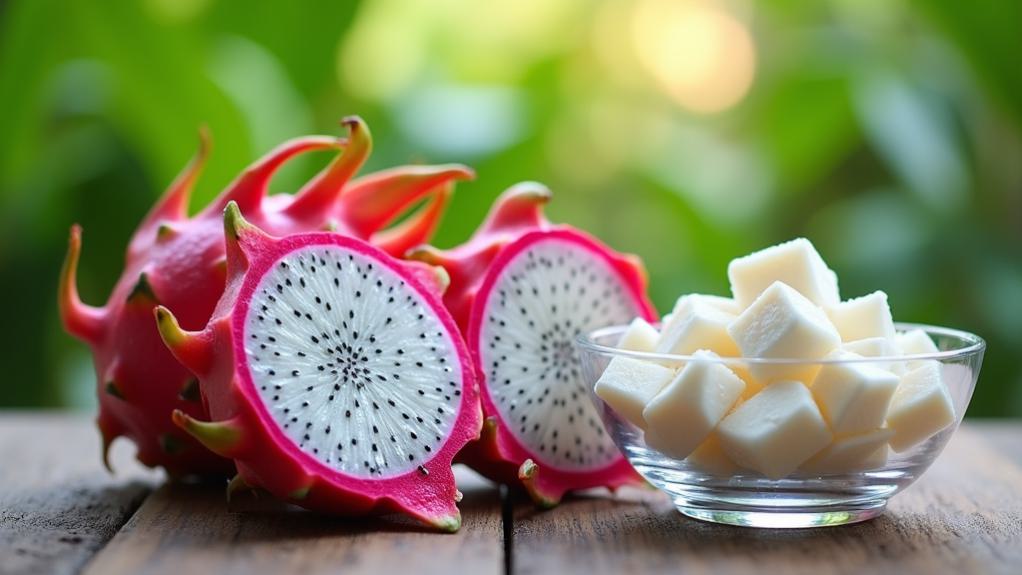
Drakono vaisių įtraukimas į mitybą gali padėti palaikyti subalansuotą gliukozės kiekį kraujyje. Šio atogrąžų vaisiaus glikemijos indeksas yra žemas (48-52), todėl saikingai vartojamas jis gali sumažinti cukraus kiekio kraujyje šuolius.
- Daug maistinių skaidulų: Gali padėti sulėtinti cukraus įsisavinimą kraujyje.
- Maža glikeminė apkrova: Glikeminė apkrova yra tik 4, todėl gali turėti minimalų poveikį cukraus kiekiui kraujyje.
- Magnio šaltinis: Gali būti būtinas jautrumui insulinui ir gliukozės apykaitai.
- Antioksidacinės savybės: Turi flavonoidų ir betalainų, kurie gali apsaugoti kasos funkciją.
- Prebiotinės skaidulos: Gali palaikyti žarnyno sveikatą, kuri yra susijusi su geresne cukraus kiekio kraujyje kontrole.
Cukriniu diabetu sergantiems asmenims patartina suvartoti ne daugiau kaip 100 g per dieną, kad būtų išvengta šuolių.
Be to, drakono vaisius derinant su baltymais ar sveikaisiais riebalais galima dar labiau stabilizuoti gliukozės kiekį kraujyje. Drakono vaisius galima valgyti žalius arba dėti į įvairius patiekalus, todėl jie yra universalus ir maistingas pasirinkimas cukraus kiekio kraujyje kontrolei gerinti.
Imuninės sistemos palaikymas
Drakono vaisiai yra galingas sąjungininkas stiprinant imuninės sistemos veiklą, visų pirma dėl gausaus antioksidantų kiekio.
Šie antioksidantai neutralizuoja laisvuosius radikalus, apsaugo ląsteles nuo pažeidimų ir stiprina organizmo gynybinius mechanizmus.
Be to, drakono vaisių prebiotinės savybės skatina naudingųjų žarnyno bakterijų augimą, dar labiau sustiprindamos imunitetą prieš patogenus.
Antioksidantai stiprina imunitetą
Drakono vaisiuose esantys antioksidantai gali sustiprinti imuninę sistemą. Drakono vaisiai, kuriuose gausu įvairių antioksidantų, atlieka svarbų vaidmenį stiprinant organizmo gynybinius mechanizmus. Šie biologiškai aktyvūs junginiai gali padėti neutralizuoti laisvuosius radikalus, apsaugoti imunines ląsteles nuo pažeidimų ir pagerinti jų funkcionalumą.
Pagrindinė antioksidantų, esančių drakono vaisiuose, nauda:
- vitaminas C: Vitaminas C: gali būti labai svarbus T-ląstelių brendimui, kuris yra labai svarbus tikslingam imuniniam atsakui.
- Betalainai: Raudonuosiuose drakono vaisiuose randami betainai: gali būti stiprūs antioksidantai, mažinantys cholesterolio kiekį kraujyje.
- Flavonoidai: Gali apsaugoti ląsteles nuo oksidacinio streso ir yra susiję su geresne širdies sveikata.
- Hidroksicinnamatai: Gali pasižymėti priešvėžinėmis savybėmis.
- Fitocheminės medžiagos: tokios kaip katechinas ir epikatechinas, kurios gali slopinti mikrobų augimą ir stiprinti imuninę apsaugą.
Įtraukdami drakono vaisius į savo mitybą galite ne tik padidinti antioksidantų kiekį, bet ir sustiprinti imuninę sistemą, todėl jie yra vertingas priedas siekiantiems pagerinti bendrą sveikatos būklę.
Prebiotikai stiprina gynybą
Drakono vaisiai gali sustiprinti imuninę funkciją ir palaikyti žarnyno sveikatą dėl savo prebiotikų savybių. Turtingi oligosacharidų, drakono vaisiai skatina naudingų bakterijų, tokių kaip Bifidobacterium spp. ir Faecalibacterium, augimą.
Tyrimai rodo, kad kasdien suvartojant 8 g drakono vaisių oligosacharidų gali padidėti Bifidobacterium spp. kiekis 8,41 %, Faecalibacterium – 1,99 %, o kenksmingų bakterijų, tokių kaip Escherichia coli, kiekis sumažėti 8,44 %. Ši žarnyno mikrobiotos moduliacija gali palaikyti bendrą žarnyno sveikatą.
Be to, drakono vaisiai gali padidinti imunoglobulino A (IgA), kuris gyvybiškai svarbus gleivinės imunitetui, kiekį. Kasdien suvartojant 4 g oligosacharidų, IgA kiekis gali padidėti 10,95 %.
Drakono vaisiuose esantys prebiotikai taip pat gali sumažinti virškinamojo trakto infekcijų riziką, taip dar labiau sustiprindami imuninį atsaką. Klinikiniai tyrimai patvirtina šį imunitetą stimuliuojantį poveikį ir pabrėžia subalansuoto žarnyno mikrobiomo svarbą optimaliam imuninės sistemos veikimui.
Drakono vaisių įtraukimas į mitybą gali būti labai naudingas kaip prebiotikas, gerinantis žarnyno sveikatą ir imuninę apsaugą.
Uždegimo mažinimas
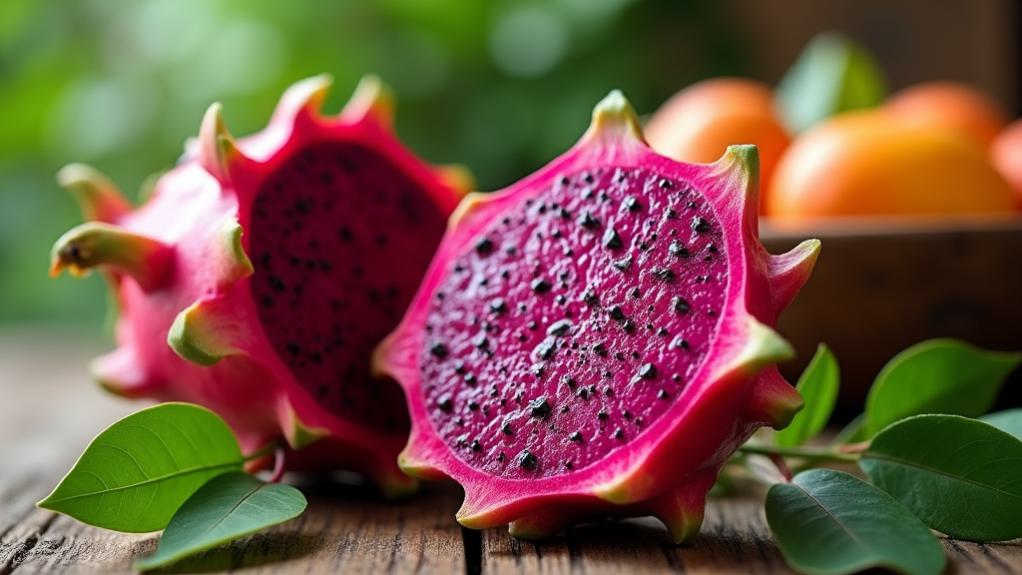
Drakono vaisių vartojimas gali būti labai naudingas sveikatai. Vaisiuose gausu priešuždegiminių junginių, įskaitant polifenolius, kvercetiną ir kitus antioksidantus, kurie kartu kovoja su uždegimu ir oksidaciniu stresu.
Pagrindinė drakono vaisių nauda mažinant uždegimą gali būti tokia:
- polifenoliai: Neutralizuodami laisvuosius radikalus ir mažindami ląstelių pažeidimus, gali sumažinti uždegimą.
- Kvercetinas: gali apsaugoti ląsteles nuo oksidacinio streso, kartu palaikydamas senėjimą stabdantį poveikį.
- Betacianinai ir betaksantinai: Gali neutralizuoti laisvuosius radikalus, užkirsti kelią tolesniam ląstelių pažeidimui ir sušvelninti tokias ligas kaip podagra ir artritas.
- Flavonoidai: Flavidai: gali sustiprinti antioksidacinį poveikį, ypač naudingi esant odos ir nervų sistemos uždegimams.
- Magnis: Gali sumažinti uždegimą skatinančio mediatoriaus interleukino-6 (IL-6) gamybą.
Be to, priešuždegiminės drakono vaisių savybės gali padėti įveikti lėtines uždegimines ligas, tokias kaip osteoartritas ir podagra, reguliuojant imuninį atsaką ir sukuriant palankią priešuždegiminę aplinką.
Prebiotinis poveikis ir didelis skaidulų kiekis gali dar labiau palaikyti žarnyno sveikatą, kuri yra labai svarbi mažinant sisteminį uždegimą. Drakono vaisių įtraukimas į savo mitybą gali būti aktyvus žingsnis geresnės bendros sveikatos link.
Privalumai širdies sveikatai
Drakono vaisiai gali būti naudingi širdies sveikatai dėl unikalaus maistinių medžiagų ir biologiškai aktyvių junginių derinio. Turtingas skaidulų kiekis gali sumažinti cholesterolio absorbciją, o betalainai gali sumažinti MTL (blogojo) cholesterolio kiekį ir padidinti DTL (gerojo) cholesterolio kiekį. Drakono vaisiaus sėklose gali būti gausu omega-3 ir omega-9 riebalų rūgščių, kurios dar labiau padeda reguliuoti cholesterolio kiekį. Be to, drakono vaisiai yra vertingas kalio ir magnio šaltinis, kurie gali padėti reguliuoti kraujospūdį dėl kraujagyslių išsiplėtimo ir geresnio kraujagyslių tonuso.
Be to, drakono vaisių vartojimas gali būti susijęs su geresne endotelio funkcija ir mažesniu arterijų standumu, o tai gerina bendrą kraujagyslių sveikatą. Antioksidantai, tokie kaip vitaminas C ir polifenoliai, esantys drakono vaisiuose, gali kovoti su oksidaciniu stresu ir uždegimu, taip sumažindami su širdimi susijusių ligų riziką.
| Nauda | Maistinė medžiaga / junginys | Poveikis širdies sveikatai |
|---|---|---|
| Cholesterolio valdymas | Betalainai, skaidulos | Gali sumažinti MTL, padidinti DTL |
| Kraujospūdžio reguliavimas | Kalis, magnis | Gali subalansuoti natrio kiekį, gali sumažinti spaudimą |
| Kraujagyslių sveikatos gerinimas | Betalainai | Gali pagerinti endotelio funkciją |
| Antioksidacinė apsauga | Vitaminas C, polifenoliai | Gali sumažinti oksidacinį stresą |
| Riebalų rūgščių nauda | Omega-3, Omega-9 | Gali sumažinti trigliceridų kiekį |
Odos sveikatos patobulinimai
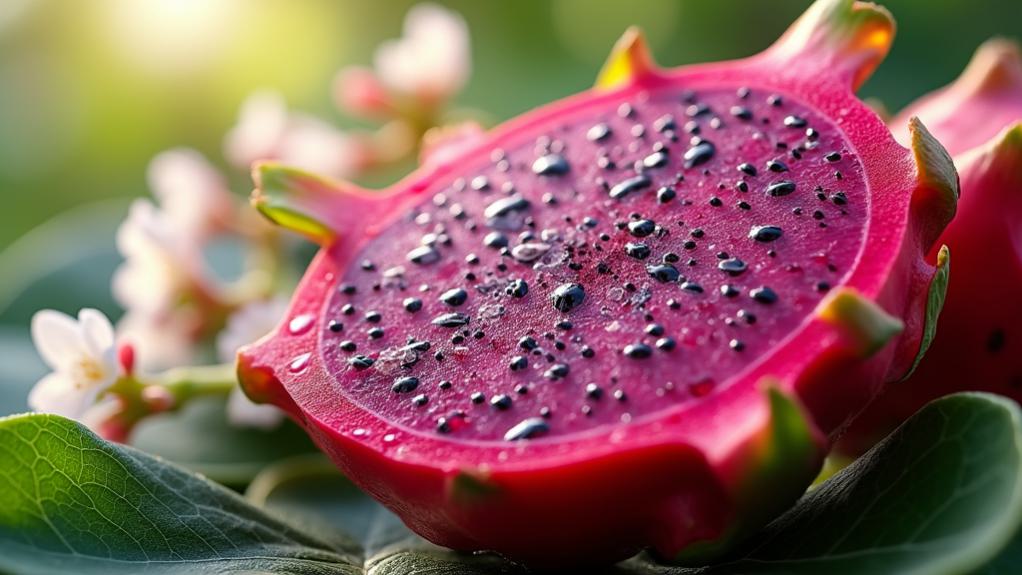
Drakono vaisiai pasižymi daugybe odos sveikatą gerinančių savybių, visų pirma dėl stiprios antioksidacinės apsaugos, kuri kovoja su laisvaisiais radikalais ir taip mažina senėjimo požymius.
Didelis vandens kiekis užtikrina veiksmingą drėkinimą ir drėgmės sulaikymą, todėl veido oda tampa skaistesnė ir jaunatviškesnė.
Be to, vaisiai pasižymi turtingu maistinių medžiagų profiliu, kuris palaiko senėjimą stabdančias savybes, todėl yra vertingas tiek dietinių, tiek vietinių odos priežiūros priemonių priedas.
Antioksidacinės apsaugos privalumai
Antioksidantai gali atlikti svarbų vaidmenį palaikant odos sveikatą, nes kovoja su oksidaciniu stresu ir neutralizuoja laisvuosius radikalus, kurie lemia priešlaikinį senėjimą.
Drakono vaisiai, kuriuose gausu įvairių antioksidantų, gali būti veiksminga apsauga nuo žalingo oksidacinio streso poveikio. Šiame gyvybingame vaisiuje esantys betacianinai, beta-ksantinai, flavonoidai, fenolinės rūgštys, karotenoidai ir polifenoliai gali labai prisidėti prie odos sveikatos.
- Gali neutralizuoti laisvuosius radikalus: Mažina oksidacinį stresą, kuris yra pagrindinė odos senėjimo priežastis.
- Gali užkirsti kelią ankstyvam senėjimui: padeda išlaikyti jaunatvišką ir švytinčią odą.
- Gali sumažinti niežulį ir paraudimą: ramina sudirgusią odą ir palengvina tokias ligas kaip egzema.
- Gali sumažinti uždegimą: Mažina uždegimą ir gali užkirsti kelią įvairioms odos ligoms.
- Gali apsaugoti nuo saulės padarytos žalos: Vitaminas C padeda apriboti UV spindulių daromą žalą odai.
Drakono vaisių įtraukimas į savo mitybą gali pagerinti odos išvaizdą ir prisidėti prie bendros odos sveikatos, skatindamas subalansuotą, švytinčią veido odą.
Drakono vaisiuose esančių antioksidantų sinergija gali padėti visapusiškai kovoti su aplinkos poveikiu, palaikyti ilgalaikę odos sveikatą ir atsparumą.
Drėkinimas ir drėgmės sulaikymas
Drakono vaisiai gali puikiai drėkinti odą, nes juose yra 84 % vandens, kuris būtinas odos elastingumui ir bendrai sveikatai palaikyti. Turtingas kalio ir magnio kiekis gali būti labai svarbus skysčių balansui, dar labiau didinant geriamojo vandens kiekį organizme.
Be didelio vandens kiekio, drakono vaisiuose gali būti šeši gramai skaidulų 240 mililitrų, kurios palaiko virškinimo sistemos sveikatą ir skatina naudingų žarnyno bakterijų vystymąsi. Tai gali padėti gerti vandenį ir prisidėti prie odos sveikatos, nes palengvina detoksikacijos procesus.
Švelnus diuretinis drakono vaisių poveikis gali padėti šalinti toksinus ir skysčių perteklių, taip skatinant švaresnę odą.
Be to, drakono vaisiuose esantys vitaminai, mineralai ir antioksidantai gali maitinti odą ir padėti jai atsinaujinti bei mažinti uždegimus. Reguliarus vartojimas gali pastebimai pagerinti odos išvaizdą, todėl ji taps sveikesnė ir labiau švytinti.
Nesvarbu, ar vartojami žali, ar maišomi į kokteilius, ar įmaišomi į įvairius patiekalus, drakono vaisiai yra universalus, mažai kalorijų turintis produktas, kuris veiksmingai palaiko geriamojo vandens ir drėgmės sulaikymą, kad užtikrintų geriausią odos sveikatą.
Senėjimą stabdančios savybės
Drakono vaisiai gali pagerinti odos sveikatą ir pasižymėti ypatingomis senėjimą stabdančiomis savybėmis. Šis egzotiškas vaisius yra antioksidantų, įskaitant vitaminą C, betalainus ir flavonoidus, kurie gali apsaugoti odos ląsteles nuo laisvųjų radikalų daromos oksidacinės žalos.
Šie antioksidantai taip pat gali kovoti su uždegimu, kuris dažnai sukelia tokias odos ligas kaip spuogai ir paraudimas, ir galiausiai skatinti jaunatvišką išvaizdą.
Pagrindinė drakono vaisių nauda odos sveikatai:
- Daug antioksidantų, kurie gali sulėtinti senėjimo procesą.
- Stimuliuoja kolageno gamybą, todėl gali sumažinti smulkias linijas ir raukšles.
- Apsaugo nuo UV spindulių daromos žalos, todėl gali sumažinti tamsias dėmes ir pagerinti tekstūrą.
- Skatina odos ląstelių atsinaujinimą ir suteikia gyvybingą veido spalvą.
- Palaiko odos mikrobiotos pusiausvyrą, galimai slopindamas kenksmingas bakterijas.
Drakono vaisiuose esantis vitaminas C gali palaikyti kolageno sintezę ir didinti odos elastingumą bei stangrumą.
Be to, jame esantys polisacharidai gali skatinti naudingų odos bakterijų dauginimąsi ir taip dar labiau pagerinti bendrą odos sveikatą.
Drakono vaisių įtraukimas į savo mitybą gali būti natūrali ir veiksminga jaunatviškos ir švytinčios odos išsaugojimo strategija.
Drėkinimas ir nauda odai
Drakono vaisiai gali būti labai naudingi geriamajam vandeniui ir odos sveikatai. Maždaug 84 % vandens sudaro natūralus geriamojo vandens šaltinis, būtinas įvairioms organizmo funkcijoms. Elektrolitų, tokių kaip kalis ir magnis, kiekis gali padėti palaikyti skysčių pusiausvyrą, todėl tai puikus pasirinkimas rehidratacijai po fizinės veiklos.
Drakono vaisiai ne tik palaiko vidinį geriamąjį vandenį, bet ir gali pagerinti odos sveikatą. Didelis vandens kiekis jame padeda drėkinti odą, o tai labai svarbu norint išlaikyti jaunatvišką išvaizdą. Vaisiai taip pat gali padidinti kolageno gamybą, pagerinti odos elastingumą ir sumažinti senėjimo požymius. Be to, jo antioksidacinės savybės gali padėti sumažinti laisvųjų radikalų kiekį, o priešuždegiminiai junginiai gali palengvinti tokias odos ligas kaip aknė.
| Nauda | Aprašymas |
|---|---|
| Didelis vandens kiekis | 84 % vandens, labai svarbus geriamajam vandeniui |
| Elektrolitai | Sudėtyje yra kalio ir magnio skysčių pusiausvyrai palaikyti |
| Odos drėkinimas | Palaiko drėgmę ir skatina sveiką veido odą |
| Kolageno gamyba | Didina odos elastingumą ir mažina senėjimo požymius |
| Antioksidantai | kovoja su laisvaisiais radikalais ir palaiko odos sveikatą |
Drakono vaisių įtraukimas į savo mitybą gali žymiai pagerinti geriamojo vandens ir odos būklę.
Energiją didinančios savybės
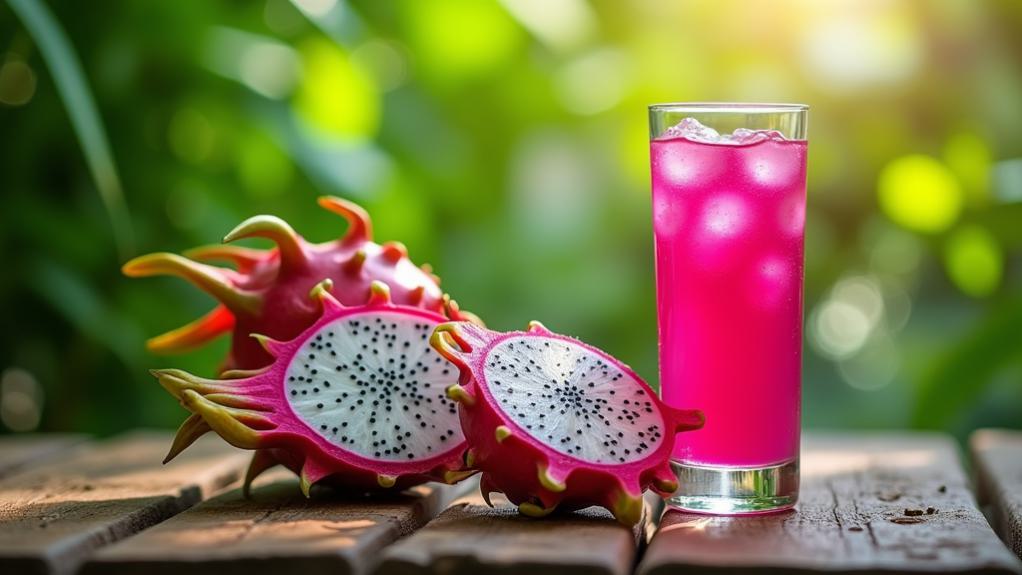
Drakono vaisiai dėl savo unikalaus maistinių medžiagų profilio gali padidinti jūsų energijos lygį, todėl jie yra puikus pasirinkimas tiems, kurie ieško natūralaus energijos antplūdžio.
- Mažai kalorijų turintis malonumas: Vienoje porcijoje yra 24-43 kalorijos.
- Gausu geležies: Suteikia nedidelę dalį per parą suvartojamos geležies, būtinos deguonies pernešimui.
- Vitaminas C Boost: gerina geležies įsisavinimą, būtinas energijos apykaitai.
- B grupės vitaminai: Palaiko angliavandenių apykaitą, labai svarbūs energijos gamybai.
- Didelis skaidulų kiekis: Lengvina virškinimą ir skatina sotumo jausmą, taip pat padeda išlikti energingiems.
Be to, drakono vaisiuose esantys antioksidantai gali padėti kovoti su uždegimu ir oksidaciniu stresu, taip dar labiau palaikydami energijos lygį.
Didelis skaidulų kiekis gali pagerinti žarnyno sveikatą, užtikrinti efektyvų maistinių medžiagų įsisavinimą ir energijos panaudojimą.
Dėl šių savybių drakono vaisiai yra idealus pasirinkimas visiems, norintiems natūraliai padidinti energijos lygį.
Įtraukę šį gyvybingą vaisių į savo mitybos racioną galite jaustis energingesni ir pasiruošę įveikti visą dieną.
Kulinarinis panaudojimas
Drakono vaisiai yra universalus ingredientas, kuriuo galima gardinti įvairius kulinarinius patiekalus, ypač šviežių vaisių salotas ir kokteilius.
Dėl ryškios spalvos ir subtilaus saldumo jis puikiai tinka vaisių salotoms, suteikdamas ir vizualinio patrauklumo, ir skonio.
Be to, įmaišyti į kokteilius drakono vaisiai suteikia svarbių maistinių medžiagų ir pagerina bendrą gėrimo skonį.
Šviežių vaisių salotos
Į šviežių vaisių salotas galima įtraukti drakono vaisių, kurie pagerina tiek vizualinį, tiek juslinį patiekalo įspūdį. Šių vaisių ryškios spalvos, ypač ryškiai raudonos ar purpurinės spalvos minkštimas, gali patraukti akį ir pagerinti bendrą salotų estetiką.
Drakono vaisius galima supjaustyti plonais gabalėliais arba supjaustyti rutuliukais, taip sukuriant patrauklų ir „Instagram” tinklui tinkantį pateikimą.
- Paįvairina salotas ryškiomis spalvomis
- Puikiai dera su tropiniais vaisiais, pavyzdžiui, ananasais ir mangais
- Švelnaus, subtilaus skonio, kuris papildo kitus ingredientus.
- Daug antioksidantų ir skaidulų, naudingų sveikatai
- Skatina kūrybiškumą ruošiant ir pateikiant
Švelnus drakono vaisių saldumas gali gerai derėti su citrusinių vaisių skoniais, pavyzdžiui, laimo sultimis, ir derėti su švelnesniais žalumynais ir vaisiais.
Jei norite papildomos tekstūros, derinkite su riešutais ir sėklomis. Drakono vaisiai yra universalus ingredientas, kuris pagerina šviežių vaisių salotų skonį ir sveikatingumą, todėl yra puikus pasirinkimas bet kokiai kulinarinei veiklai.
Kokteilių stiprikliai
Drakono vaisių įtraukimas į kokteilius gali įprastą gėrimą paversti ryškiu ir maistingu malonumu. Šis nuostabus vaisius gali suteikti gražų rožinį atspalvį ir subtilų saldumą, kuris pagerina bendrą skonio profilį. Kad skonis būtų visavertis, sumaišykite drakono vaisius su bananais, mangais ir uogomis.
Jei norite sukurti kreminį pagrindą, rinkitės ne pieno pieną, pavyzdžiui, migdolų, kokosų ar avižų pieną. Šviežių laimo sulčių išspaudimas gali suteikti kokteiliui tropinio aromato. Jei norite gauti papildomos maistinės naudos, įmaišykite baltymų miltelių, chia sėklų arba kanapių sėklų.
Turint po ranka šaldytų drakono vaisių ir kitų vaisių, paprasčiau paruošti; tiesiog sumaišykite šaldytus ingredientus su pasirinktu ne pieno pienu ir norimo tirštumo ledo kubeliais.
Viename puodelyje drakono vaisių gali būti apie 60 kalorijų ir 3 g skaidulų, o dėl gausaus vitamino C ir antioksidantų kiekio jie gerina virškinimo sistemos sveikatą ir palaiko imuninę sistemą.
Drakono vaisius galite derinti su tropiniais vaisiais, pavyzdžiui, ananasais, arba derinti su mėlynėmis, kad saldžiarūgštis skonis būtų subalansuotas. Naudokite drakono vaisius kokteilių dubenėliuose, papildydami juos riešutais ir sėklomis, kad jų tekstūra ir skonis būtų puikūs.
Kaip pasirinkti drakono vaisius
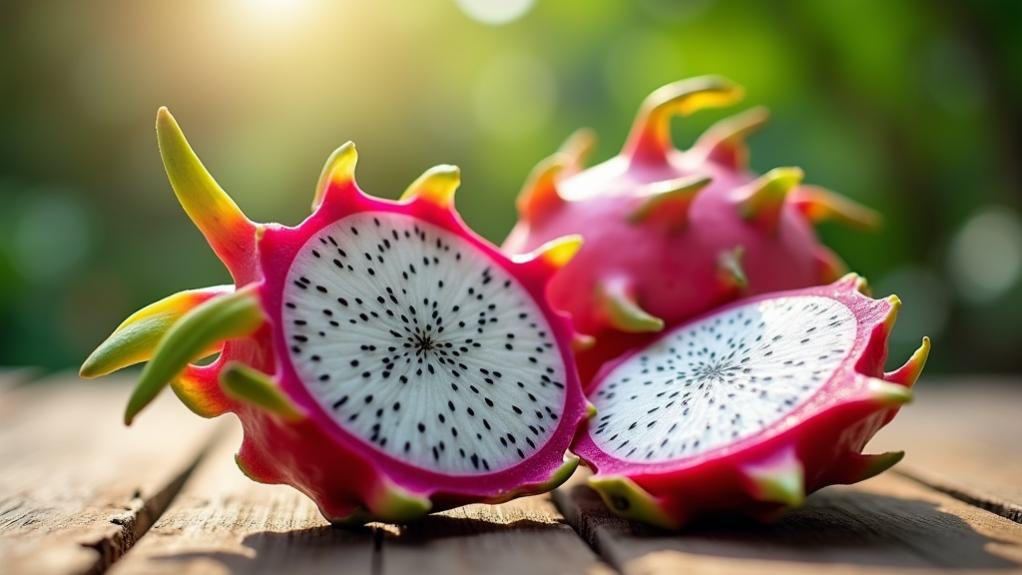
Rinkdamiesi drakono vaisius atkreipkite dėmesį į ryškią odelės spalvą, kuo mažiau žalių dėmių ir nedidelį paslankumą paspaudus. Aukštos kokybės drakono vaisiaus odelė gali būti ryški, spalvinga, su vaškiniu blizgesiu, lygi, be didesnių dėmių ar sumušimų, ir, atsižvelgiant į jos dydį, sunki, o tai rodo, kad vaisius prinokęs.
Be to, vaisiaus kotelis turi būti žalias ir elastingas, venkite sausų ir sudžiūvusių vaisių. Prinokęs drakono vaisius gali skleisti subtilų, saldų aromatą prie pagrindo, kur buvo pritvirtintas kotelis.
Venkite neryškių ar išblukusių spalvų vaisių, nes jie gali būti ne švieži. Nepamirškite, kad nuskynus derlių drakono vaisiai gali toliau nokti, todėl neprinokusius vaisius galima kelias dienas palikti kambario temperatūroje, kad jie būtų saldesni.
Paprasti receptai, kuriuos galite išbandyti
Drakono vaisiai gali būti puikus pagrindas įvairiems gardiems ir maistingiems receptams. Paprastas, bet energingas variantas – tai drakono vaisių salotos, kuriose vienas atšaldytas drakono vaisius derinamas su 150 g pjaustytų šviežių vaisių, pavyzdžiui, obuolių ir vynuogių. Įmaišykite suplėšytų salotų ir mėtų, apšlakstykite medumi ir patiekite su drakono vaisiaus žievele, kad salotos būtų patrauklios.
Jei norite spalvingos ir žvalinančios alternatyvos, sukurkite vaisių salotas iš arbūzų ir kantalupų rutuliukų, kivių, mėlynių ir granatų sėklų. Įmaišykite šviežių mėtų, laimo sulčių ir žievelės, kad salotos įgautų pikantišką skonį ir būtų vizualiai patrauklus patiekalas.
Kitas unikalus būdas – derinti du drakono vaisius su „cara cara” apelsinais. Mišinį apšlakstykite laimo sirupu ir pabarstykite „Tajín”, kad gautumėte žavų prieskonį.
Galiausiai, sumaišykite drakono vaisius su kiviais, ananasais ir apelsinų bei medaus ir mėtų padažu. Šios salotos ne tik pasižymi ryškiu skoniu, bet ir turi daug maistinių medžiagų, kurios palaiko bendrą sveikatą.
Kiekviename recepte pabrėžiamas drakono vaisiaus universalumas, todėl jį verta įtraukti į savo mitybos racioną.

